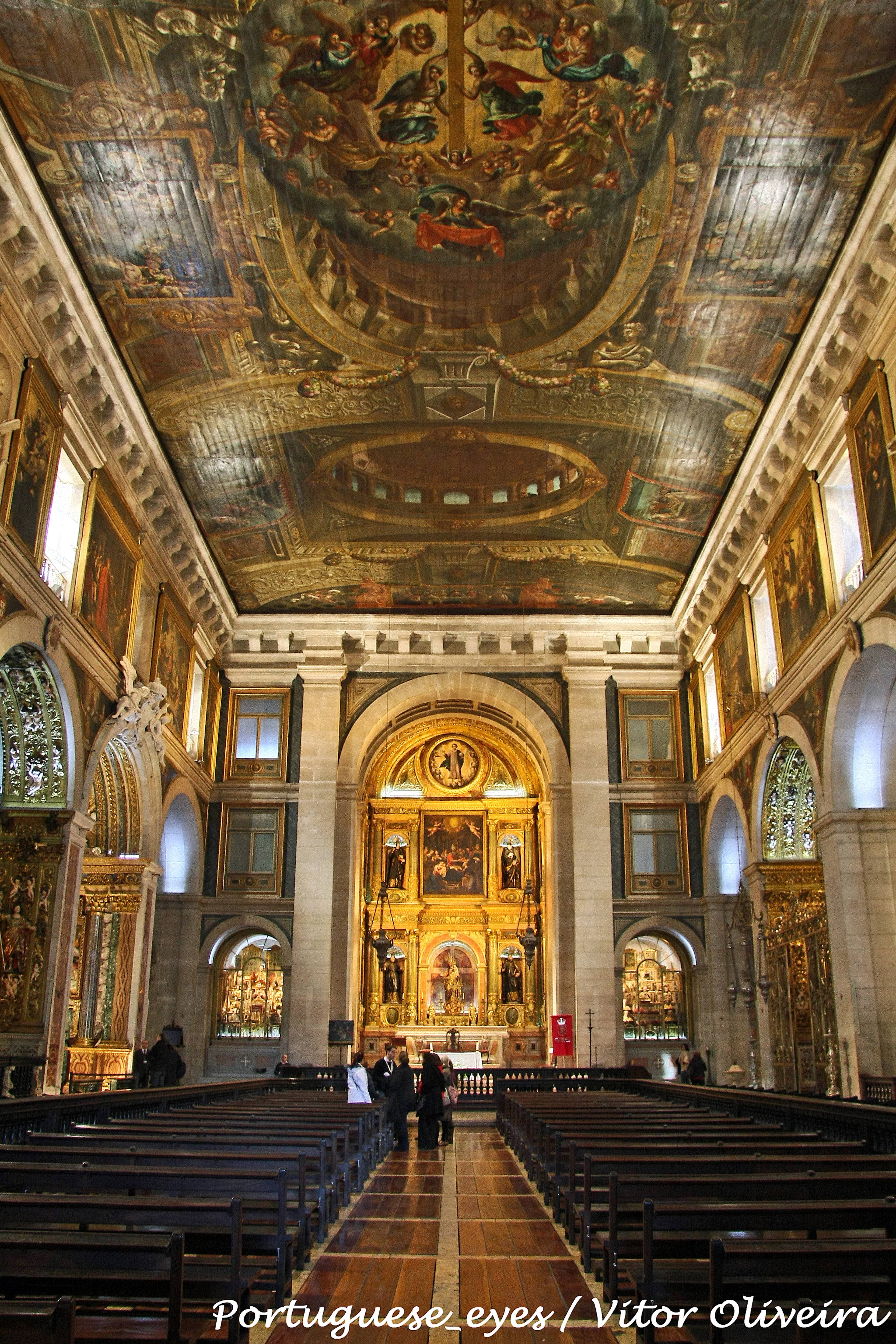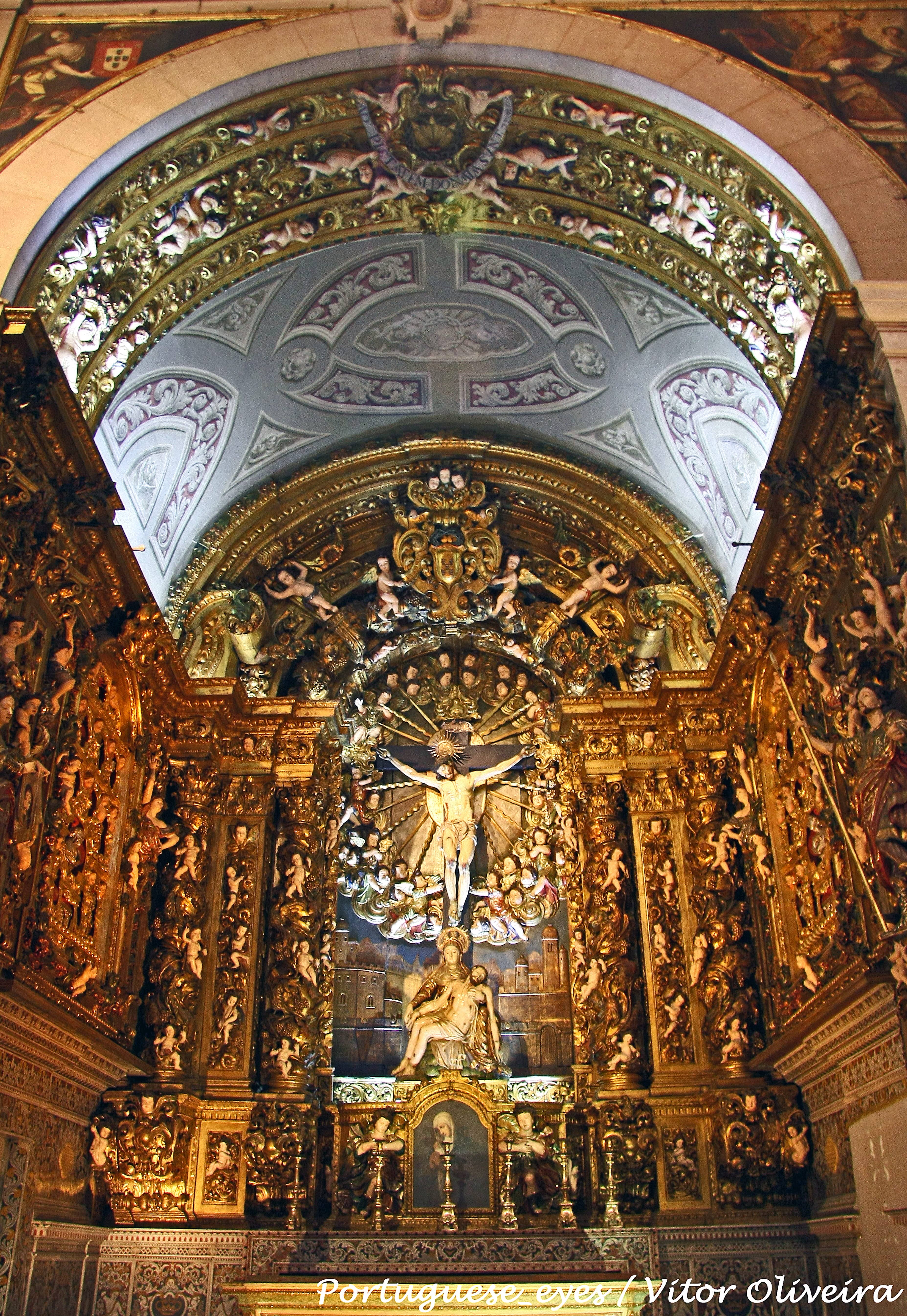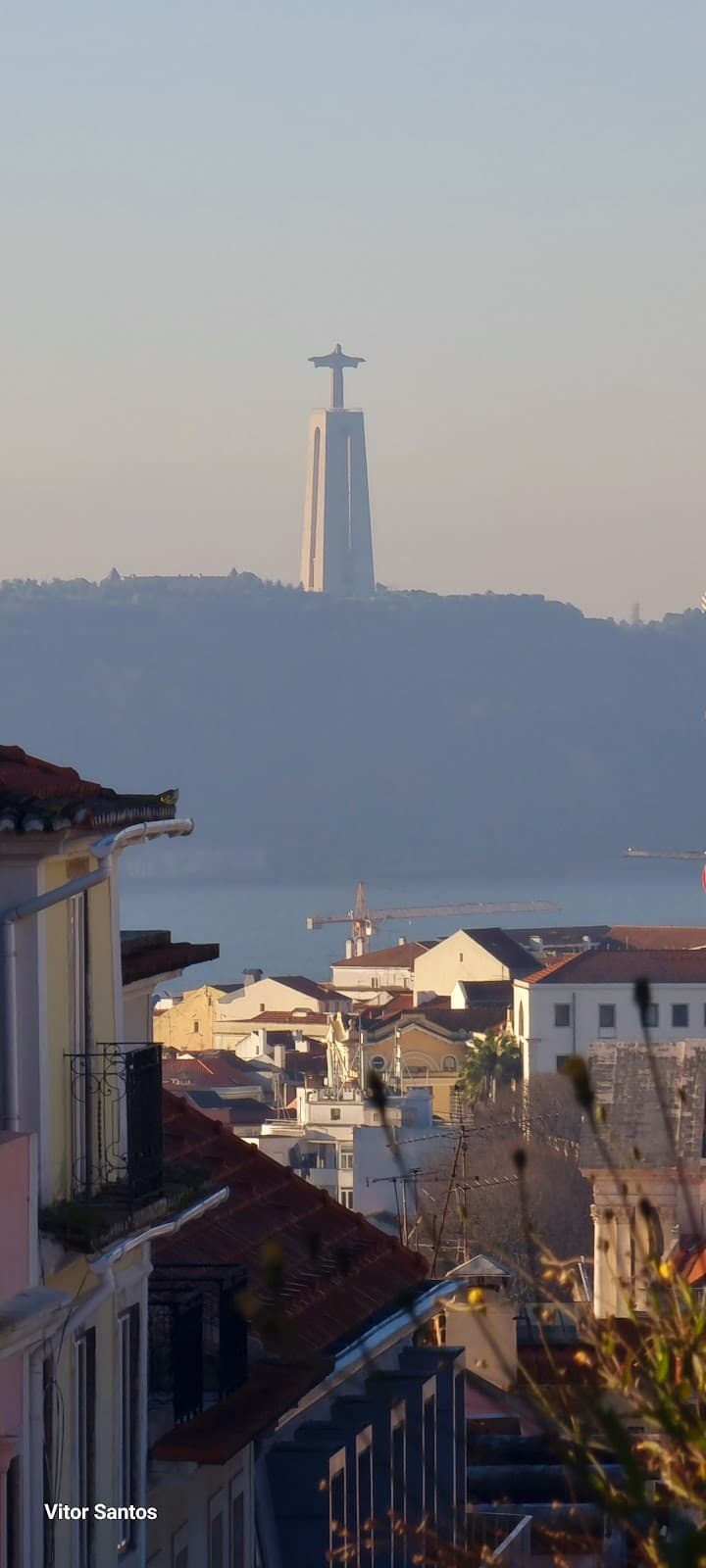
Igreja de São Roque & Museum Lisbon
Discover Lisbon's rich sacred art in the opulent Igreja de São Roque and its museum, housed in a historic 17th-century cloister.

Highlights
Must-see attractions

Social
From TikTok & Reddit
Best Time
Fewer crowds, peaceful exploration

Igreja de São Roque & Museum Lisbon
Best Time
Fewer crowds, peaceful exploration

Highlights
Must-see attractions
Discover Lisbon's rich sacred art in the opulent Igreja de São Roque and its museum, housed in a historic 17th-century cloister.
"A hidden gem of Baroque artistry, the Igreja de São Roque will leave you speechless with its gilded splendor."

Wear Comfortable Shoes
You'll be doing a lot of walking inside the church and museum. :athletic_shoe:
Check Opening Hours
Hours can vary, especially on holidays. Best to confirm before you go. :clock1:

Highlights
Discover the most iconic attractions and experiences

The Church of São Roque
Main sanctuary
Marvel at the opulent Baroque interior, adorned with gilded carvings and intricate tilework. A true feast for the eyes!

Sacred Art Museum
17th-century cloister
Explore a vast collection of Portuguese religious art, including paintings, sculptures, and vestments.

Chapel of St. John the Baptist
Side chapel
Admire this stunning chapel, a masterpiece of Roman Baroque art, featuring exquisite marble and mosaics.
Plans like a pro.
Thinks like you
Planning Your Visit
Plan Your Visit
Getting There & Around
Best Times
Insider Tips
from TikTok, Instagram & Reddit
Wear Comfortable Shoes
You'll be doing a lot of walking inside the church and museum. :athletic_shoe:
Check Opening Hours
Hours can vary, especially on holidays. Best to confirm before you go. :clock1:
Allow Ample Time
Don't rush! Take your time to appreciate the art and architecture. :hourglass:
Photography Etiquette
Be mindful of where photos are allowed. Some areas may prohibit flash. :camerawithflash:
Tips
from all over the internet
Wear Comfortable Shoes
You'll be doing a lot of walking inside the church and museum. :athletic_shoe:
Check Opening Hours
Hours can vary, especially on holidays. Best to confirm before you go. :clock1:
Allow Ample Time
Don't rush! Take your time to appreciate the art and architecture. :hourglass:
Photography Etiquette
Be mindful of where photos are allowed. Some areas may prohibit flash. :camerawithflash:
What Travellers Say
Reviews Summary
Visitors are consistently impressed by the breathtaking beauty and opulence of the Igreja de São Roque's interior, particularly its gilded woodwork and the stunning Chapel of St. John the Baptist. The Sacred Art Museum is appreciated for its collection, though some find it less engaging than the church itself. The central location is a major plus, making it easy to combine with other Lisbon explorations.
"The Museum of Sao Roque is attached to the historic Church of Sao Roque at Largo Trindade Coelho. Entry is (€2.50 per adult). You can also see the church (free entry) as part of your visit.
The Museum includes two floors and probably 9-10 gallery rooms filled with church artefacts, artworks and other historic religious items. Highlight of the museum are the treasures from the Chapel of St. John the Baptist which is located in the Church near the high altar.
There is also a cafe with inner courtyard seating and access if you fancy a drink or bite to eat before or after your visit to the museum.
In the end, the collection at the Museum of Sao Roque is really good, a fitting complement to seeing the church and overall very good combined experience. Recommend allowing around 20+ minutes to browse the full museum collection."
Brad
"An amazing museum, and very cheap. A pearl in Lisbon thst should have more visitors, it is mostly empty of tourism. Very well located near one of the best sightseeings in Lisbon. You really should go, the ticket is €2,50."
João Lourenço
"This is attached to the Jesuit church, but unlike the church, you will pay to enter this museum (€5). Really it's not a lot to pay for a decent museum. Still there are a lot of neat pieces to be seen here as well as a continuation of the architecture of the church. There's also a nice statue out front."
snarkyguy
What People Like
What People Dislike
Frequently Asked Questions
🚇 🗺️ Getting There
The Igreja de São Roque is centrally located. You can easily reach it by metro to Baixa-Chiado or Rossio stations, followed by a short walk. Trams and buses also serve the area. Many visitors enjoy walking from nearby Bairro Alto or Chiado.
Yes, it is very well-connected. The closest metro stations are Baixa-Chiado and Rossio. Several bus lines also stop nearby, making it convenient to reach from various parts of Lisbon.
From Lisbon Airport (LIS), you can take the metro (Red Line to Saldanha, then change to Green Line to Baixa-Chiado) or a taxi/ride-sharing service directly to the church. The metro is a cost-effective option.
Absolutely! It's a pleasant walk from popular areas like Bairro Alto, Chiado, and even Rossio Square. Be prepared for some uphill sections as Lisbon is known for its hills.
Street parking in this central Lisbon area can be very difficult and expensive. It's highly recommended to use public transportation or a taxi/ride-sharing service rather than driving.
🎫 🎫 Tickets & Entry
Entry to the main church is typically free, allowing you to admire its stunning architecture. However, there is usually a fee to enter the Sacred Art Museum located within the cloister.
Opening hours can vary, so it's best to check the official website or a reliable tourist information source before your visit. Generally, the church is open daily, while the museum might have specific hours and be closed on certain holidays.
Admission fees for the museum are subject to change. It's advisable to check the latest prices online. Consider purchasing a Lisbon Card if you plan to visit multiple attractions, as it may offer discounts.
While some attractions offer online booking, it's not always standard for smaller museums like this. You can usually purchase tickets directly at the museum entrance. Check their official website for the most up-to-date information.
Discounts may be available for students, seniors, or groups. The Lisbon Card often includes free or discounted entry to many museums and attractions in the city.
🎫 🧭 Onsite Experience
The church itself is a masterpiece of Baroque art, featuring incredible gilded woodwork, painted ceilings, and azulejo tiles. Don't miss the Chapel of St. John the Baptist, a stunning example of Roman Baroque design.
The museum houses a significant collection of Portuguese sacred art from the 16th to the 18th centuries. You'll find religious paintings, sculptures, liturgical objects, and vestments.
To fully appreciate both the church and the museum, allocate at least 1.5 to 2 hours. If you're a keen art enthusiast, you might want to spend a bit longer.
Photography is generally permitted in the church, but often without flash. In the museum, rules can be stricter, and flash photography is usually prohibited to protect the artifacts. Always look for signage.
While the art and history might be more appreciated by older children and adults, the grandeur of the church can be impressive for younger visitors. The museum's exhibits might be less engaging for very young children.
🍽️ 🍽️ Food & Dining
No, there are no restaurants or cafes located directly within the Igreja de São Roque or its museum. You'll need to step outside to find dining options.
The church is situated in a vibrant area of Lisbon, close to Bairro Alto and Chiado, which are packed with restaurants, cafes, and bars offering a wide range of Portuguese and international cuisine.
Yes, you'll find plenty of traditional Portuguese restaurants (tascas) in the surrounding neighborhoods. Look for places serving bacalhau (codfish), cozido à portuguesa (stew), and fresh seafood.
You can find more affordable options by exploring smaller side streets away from the main tourist thoroughfares. Look for 'prato do dia' (dish of the day) specials at local tascas.
Numerous cafes and pastelarias (pastry shops) are scattered throughout the nearby streets, perfect for a quick coffee, a traditional Portuguese pastry like a pastel de nata, or a light snack.
📸 📸 Photography
The main altar and the opulent Baroque interior offer stunning photographic opportunities. The Chapel of St. John the Baptist is particularly photogenic with its intricate marble work.
Yes, photography rules can be strict in museums to protect the artifacts. Flash photography is almost always prohibited. Always check for signs or ask staff if you're unsure.
Weekday mornings, when the light might be softer and crowds thinner, can be ideal. However, the interior lighting is often artificial, so focus on capturing the details and grandeur regardless of the time.
Yes, the exterior of the church is also architecturally interesting and can be photographed from the street. The surrounding Lisbon streets provide a good backdrop.
A versatile lens (like a 24-70mm equivalent) is useful for both wide interior shots and details. A prime lens with a wide aperture can be great for low-light conditions inside. A smartphone camera is also perfectly adequate for most visitors.
For Different Travelers
Tailored advice for your travel style
👨👩👧 Families with Kids
Tip: Consider focusing on the main church's grandeur and perhaps a few key pieces in the museum. Combine the visit with a walk through the lively streets of Bairro Alto or Chiado, which offer more immediate sensory stimulation for kids. Look for cafes with outdoor seating for a relaxed break.
🏛️ Art & History Enthusiasts
Recommendation: Dedicate ample time to explore both the church and the museum thoroughly. Consider researching the history of the Society of Jesus (Jesuits) in Portugal, as São Roque was a significant Jesuit church. Look for guided tours if available, as they can offer deeper historical context and highlight specific artistic details you might otherwise miss.
Deep Dives
In-depth insights and expert knowledge
The Artistry of São Roque
One of the most significant highlights is the Chapel of St. John the Baptist. This chapel, originally from Italy, was brought to Lisbon and reassembled. It's a masterpiece of Roman Baroque, featuring exquisite marble work, precious stones, and intricate mosaics, showcasing a different, more classical yet equally impressive style compared to the rest of the church.
The Sacred Art Museum, housed in the former Jesuit cloister, complements the church's visual splendor. It offers a deep dive into Portugal's religious heritage, displaying a rich collection of paintings, sculptures, vestments, and liturgical objects spanning several centuries. It provides context and a more intimate look at the devotional practices and artistic expressions of the past.
Navigating Lisbon's Historic Heart
Getting around this area often involves a fair amount of walking, and given Lisbon's famous seven hills, comfortable footwear is essential. Public transport, including the metro and trams, is an excellent way to navigate the city and reach the vicinity of São Roque. The metro stations Baixa-Chiado and Rossio are within walking distance, offering easy access from other parts of Lisbon.
For those who enjoy exploring on foot, the journey to São Roque can be part of the experience. Wandering through the narrow cobblestone streets, you'll discover hidden squares, traditional shops, and stunning viewpoints (miradouros) that offer panoramic vistas of the city and the Tagus River. This immersive exploration is a key part of the Lisbon experience.






Social
from TikTok, Instagram & Reddit